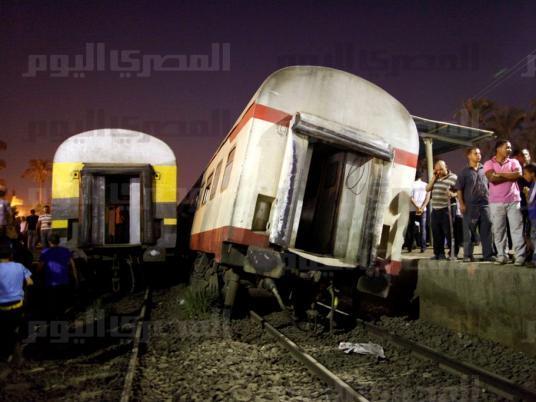 President Mohamed Morsy accepted the resignation of Transportation Minister Rashad al-Matiny Saturday, after a train collided with a school bus and killed 50, almost all of whom reportedly were schoolchildren.
President Mohamed Morsy accepted the resignation of Transportation Minister Rashad al-Matiny Saturday, after a train collided with a school bus and killed 50, almost all of whom reportedly were schoolchildren.
Judicial sources told Al-Masry Al-Youm that Public Prosecutor Abdel Meguid Mahmoud has summoned TMatiny and the head of the Egyptian National Railway Authority Mostafa Qenawi for questioning after a train collided with a school bus that was crossing the tracks in Manfalout, near Assiut.
Mahmoud also told prosecutors to find witnesses to testify about the events surrounding the crash.
An official source at the Cabinet told Al-Masry Al-Youm that Prime Minister Hesham Qandil is traveling to Assiut today to monitor the situation. Qandil will be accompanied by Interior Minister Ahmed Gamal Eddin, Local Development Minister Ahmed Zaki Abdeen, and Health Minister Mohamed Mostafa Hamed.
Prime Minister Hesham Qandil ordered an investigation to find out who was responsible for the crash.
The death toll rose to 50 after the crash, according to the Assiut security chief, and initial investigations indicate that all of the dead are children. Victims’ parents have flooded the site in protest, demanding the execution of those responsible.
Security sources told Al-Masry Al-Youm that Egyptian security forces arrested an Egyptian Railways worker in Assiut for failing to close a train barrier at the crossing, allowing the bus to cross the tracks into the path of the oncoming train.
The Egyptian Railway Authority disputed the security services’ account of the story, however, claiming that the barrier was closed and that the bus driver drove through it.
"The barrier was turned on with lights and bells, and guarded [by a] sentry and a traffic police officer, but the [bus] driver’s storming it and not waiting for the train to pass led to the collision,” the authority said in a statement.
The state news agency said another 13 people were injured in the crash. A medical source said as many as 28 were injured, 27 of them children.
Egypt's roads and railways have a poor safety record and Egyptians have long complained successive governments have failed to enforce basic safety standards, leading to a string of deadly accidents.
"They told us the barriers were open when the bus crossed the tracks and the train collided with it," said Mohamed Samir, a doctor at Assiut hospital where the injured were taken, citing witness accounts.
He said the bodies of many of those killed were severely mutilated, indicating the force of the crash, which took place in the city of Manfalut, near Assiut, about 300 km (190 miles) south of the capital.
"I saw the train collide with the bus and push it about 1 km (half a mile) along the track," said Ahmed Youssef, a driver.
Another witness also said the train hit the bus with great force, smashing up the bodies.
Transportation Minister Rashad al-Matiny offered his resignation, which President Mohamed Morsy was considering, state media reported.
Morsy ordered his ministers to offer support to the families of those killed, the official news agency said. Prime Minister Hesham Qandil ordered that those responsible for the crash be investigated.
Families of those involved in the crash protested at the scene, the state news agency reported. Officials sought to reassure them that the case would be investigated and they would receive help, it said.
Earlier this month, at least three Egyptians were killed and more than 30 injured in a train crash in Fayoum, another city south of Cairo. In July, 15 people were injured in Giza, close to the capital, when a train derailed.
Egypt's worst train disaster was in 2002 when a fire ripped through seven carriages of an overcrowded passenger train, killing at least 360 people.
Many more have been killed in rail accidents since then despite pledges from successive government to improve safety. Accidents involving multiple deaths are also common on Egypt's poor road network.



